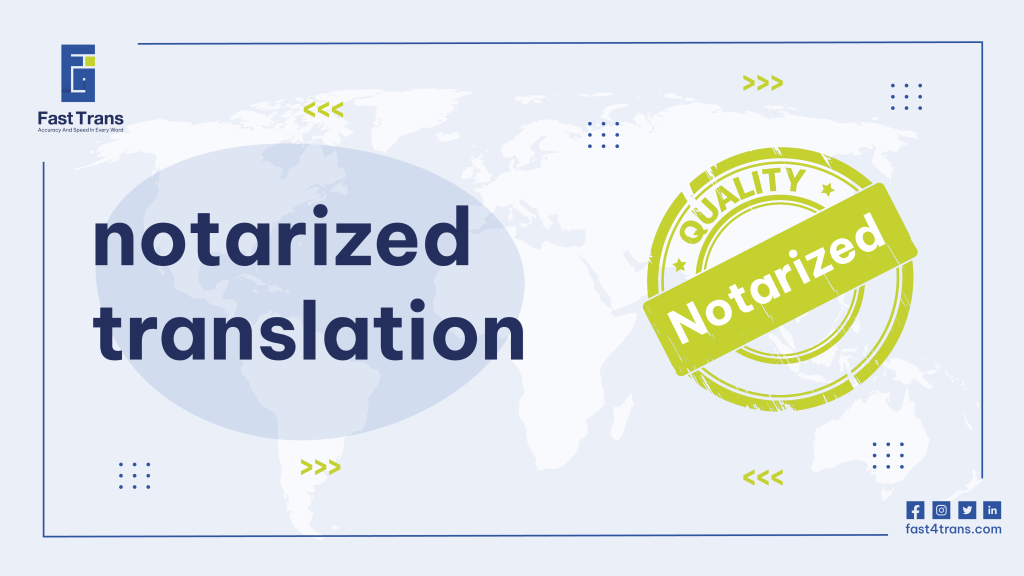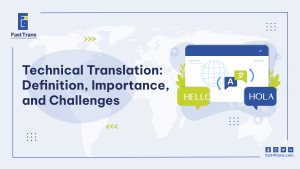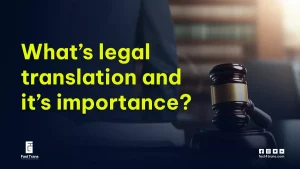It is common for people to mix types of translations with one another. A famous one of these instances is the confusion of certified and notarized translations that are often used interchangeably in different contexts.
This article will give a thorough guide to all that you need to know about notarized translations.
The information here will come in handy whenever you are translating documents of official or legal matters, answering questions like, what is notarized translation, how to obtain notarized translations, and what exactly are the duties of a Notary public.
An Arabic Notarized Translation is an officially authenticated Arabic translation. The notary verifies the translator’s identity and signature, but not the translation quality. This is often required for legal documents.
What is a Arabic Notarized Translation?
Firstly, notarization refers to the authentication of legal documents. A notary is authorized by the government to take note of legal acts, in the form of witnessing signatures. In Arabic, it means “tawtheq-توثيق”.
Therefore, a notarized Arabic translation does not refer to a field of translation, as much as it refers to a characteristic of a translated document from or into Arabic. When saying a translation is notarized, this simply means it was stamped, agreed, and signed by a notary, who on their part ensures that everyone involved in the translation to or from Arabic has been accurate and followed the right procedures.
For this, notarized Arabic translations are important, and are sometimes required by official institutions to avoid fraud, and protect the legal rights of people.
In short, a notary verifies the identity of the translator and attests to the authenticity of his or her signature, but they do not affirm the quality of the translation itself into or from Arabic.
What is Notary in Arabic?
The most common and accurate Arabic terms for “notary” or “notary public” are:
- كاتب العدل (katib al-adl) – This literally translates to “scribe of justice” and is widely used for a Notary Public.
- موثِّق (muwathiq) – This term generally means “one who authenticates or certifies.”
- التوثيق (al-tawthiq) – This refers to the act of notarization/authentication.
You will often see كاتب العدل used in official contexts.
How to Arabic notarize a translation?
If you are required by a certain institution, either national or international, to submit a notarized Arabic translation, the process to attain this is relatively straightforward.
Firstly, you translate the document into Arabic, or hire a professional or a certified translator to do so.
Secondly, after the Arabic translation is finished, it should be submitted for review to a notary, who will compare the source and target (Arabic) documents to ensure accurate delivery.
The notary will require identity identification and will be present while the translator stamps the Arabic document as certified. After that, they will seal the document themselves, and keep a record of it.
Now we have mentioned ‘certified Arabic translation’, but what is it, and how is it different from ‘notarized Arabic translation’?
What is the difference between certified and notarized translation?
Certified translations happen before notarization. The name might mislead people to think that it has to be done by a ‘certified translator’. Certified translations can be attempted by any professional translator, it involves a certificate that validates the accuracy of the word-for-word translation, signed, and stamped by the translation company or the translator.
For a translation to be called certified, it needs to translate all of the textual, and non-textual elements from the source text to the target text, including seals, formatting, signatures, and stamps.
After that, if necessary, more credibility and validity can be given to the translation by having a notarization signature signed by the notary public.
Depending on the institution that requests the documents, you might just need a certified translation or both a certified and a notarized translation.
the key difference between a certified translation and a notarized translation lies in who verifies the translation and what they are verifying.
Here is a breakdown of the two:
1. Certified Translation
- What it is: A translation that includes a signed statement (Certificate of Accuracy) from the translator or translation agency.
- What is verified: The translator/agency confirms that the translation is complete and accurate to the best of their knowledge.
- Who provides it: A qualified professional translator or a recognized translation company. In some jurisdictions, this must be a “sworn” or “official” translator appointed by a government body.
- Focus: The quality and completeness of the translation itself.
2. Notarized Translation
- What it is: A certified translation that has gone through an additional layer of official verification by a Notary Public.
- What is verified: The Notary Public verifies the identity of the translator who signed the Certificate of Accuracy and witnesses their signature on an affidavit. Crucially, the notary usually does not verify the accuracy of the translation content.
- Who provides it: The translator must sign the accuracy statement (affidavit) in the presence of a Notary Public, who then applies their official seal and signature.
- Focus: The authenticity of the translator’s signature and the official procedure followed.
When do you need Arabic Notarized Translation services?
Given its official nature, notarization is often required for Arabic documents relevant to court, property, wills, marriage, inheritance, birth or divorce certificates, bank statements, and sales contracts. It differs from one country to another which Arabic document might require notarization.
If you are planning to live abroad, emigrate, or study in a new country, you will most likely be required to submit notarized translations of your Arabic documents.
What is a Notary Public and what they can and can’t do when it comes to certified translation?
Notaries are persons who underwent training and took an oath to authorize them to oversee several legal transactions, including certified translation of documents. They can work independently or for a company.
A notary’s stamp on a translation is meant to confirm the identity of the translator.
However, it does not verify the quality of the translation itself. The notary does not authenticate the source document, nor the target document translation.
Do immigration translations need to be notarized?
Usually, not all documents concerning immigration are required to be notarized, except for significant ones.
It is noteworthy to mention that this depends on each country. To obtain this information it is best to consult a translator specialized in immigration documents and also consult a country’s foreign affairs policies.
Can I notarize the translations myself?
The main purpose of a Notary is to prevent fraud, therefore a notary is not authorized to notarize their documents. Therefore, the short answer is No.
Yet, you can translate the document yourself if you have a professional command of the language and are well-accustomed to legal documents, then have it notarized by a different notary.
How can I translate and notarize a document into any language in Fast Trans?
That being said, the process of obtaining a notarized translation in Egypt is made easy in Fast Trans. By contacting the company, and sending your document, Fast Trans ensures a speedy translation that can be delivered in less than 24 hours. After agreeing on a deadline and pricing, the company will take care of the certified translation, and upon review, it will proceed with notarization.
A translation certificate will be attached to show the international validity of the document that can be submitted to U.S. Immigration Courts (USCIS).
Get Your Arabic Notarized Translation Done Right with Fast Trans.
Understanding the difference between certified and notarized Arabic translation is the first step—now take the most crucial next step. Don’t risk having your vital legal, immigration, or court documents rejected due to incorrect procedure or missing authentication.
Fast Trans makes the process seamless: we provide expert, certified Arabic translations and handle the entire notarization process for you, often with delivery in under 24 hours.
Secure the official validity of your documents today! Contact Fast Trans for a speedy quote and ensure your Arabic Notarized Translation is accepted the first time.
What Our Customers Say
Since the translation project is theirs, we encourage the clients to discuss every stage of the process.
You can check our clients’ comments for yourself at Google Reviews.
Conclusion
An Arabic Notarized Translation refers to a translated document, either from or into Arabic, that has been officially authenticated by a notary public. This process, known as “tawtheq” in Arabic, signifies that the notary has verified the identity of the translator and witnessed their signature on the translation. It’s crucial to understand that notarization doesn’t certify the quality of the Arabic translation itself, but rather confirms the translator’s identity and signature. This added layer of legal validity is often required by official institutions to prevent fraud and protect the legal rights of all parties involved.
The process of obtaining a notarized Arabic translation involves first completing the translation, ideally by a professional or certified translator. Then, this translation is submitted to a notary public who compares the source and translated Arabic documents for accuracy. The notary will verify the translator’s identity, witness their signature on the certified translation, and then apply their own seal and keep a record of the notarization. This process is distinct from a certified translation, which simply involves a translator or translation company attesting to the accuracy of the translation. Notarization adds an extra layer of legal assurance, often required for official documents like court papers, property deeds, or immigration documents, depending on the specific requirements of the requesting institution.










